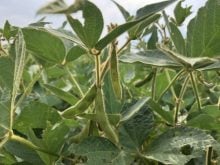Canada’s Competition Bureau says it’s “actively reviewing” BASF’s suitability as a buyer of the crop seed and chemical assets Bayer has to sell to get the bureau’s blessing to buy Monsanto.
The Competition Bureau said Wednesday it has an agreement with Bayer to deal with “concerns that the proposed transaction would have significantly harmed competition and innovation in Canada’s agricultural sector.”
Germany’s Bayer has been collecting regulatory approvals worldwide for its takeover of U.S. peer Monsanto, an all-cash deal it first proposed in September 2016.
Read Also

India slaps 30 per cent import duty on yellow peas
India has imposed a 30 per cent duty on yellow pea imports with a bill of lading date on or after Nov. 1, 2025.
Several of those approvals, including the blessing obtained Tuesday from the U.S. Department of Justice’s (DOJ) antitrust division, have arrived in recent weeks ahead of a June 14 deadline, after which Monsanto could pull out of the deal or seek a higher price than Bayer’s US$128 per share offer if it wishes.
The bureau said Wednesday its review has concluded the proposed deal would “likely substantially lessen and prevent competition in Canada” in the supply of canola seeds and traits, soybean seeds and traits, carrot seeds, and certain seed treatments used to protect crops against nematodes.
To that end, the bureau’s agreement calls for the sale of a list of assets that Bayer has largely already agreed to sell to German seed and chemical peer BASF, to meet other regulators’ conditions.
Those include Bayer’s canola seed and traits business, soybean seed and traits business, carrot seed business, nematode seed treatment business, glufosinate ammonium (a.k.a. Liberty) herbicide business, LibertyLink herbicide tolerance technology and digital farming business in Canada.
The bureau’s agreement also calls for Bayer to shed assets related to its Centurion herbicide, a clethodim (Group 1) post-emergent product registered in Canada for control of grasses in crops such as canola, soybeans, flax, peas, chickpeas, lentils, potatoes and sunflowers, among others.
The bureau, which noted BASF has been proposed as the buyer of all those assets under the agreement, added it “is actively reviewing the suitability of BASF as the proposed buyer of these assets.”
The bureau’s more detailed position statement on its Bayer-Monsanto review is expected to be published “in the coming days,” it said.
John Pecman, Canada’s commissioner of competition, said Wednesday the bureau’s agreement with Bayer “will protect competition and innovation in Canada’s agricultural sector, and is the result of a collaborative approach with the parties and our international counterparts” such as the European Commission and the DOJ.
‘Stuck’
Some organizations scoffed at the bureau’s announcement, among them the National Farmers Union, whose vice-president Jan Slomp said Thursday it’s “foolish to believe that genuine competition between four global agribusiness companies that control over 70 per cent of the market will keep input prices down and spur innovation.”
Specifically, the NFU said, given ChemChina’s takeover of Syngenta and DowDuPont’s plans to spin off its merged seed and ag chem businesses under the name Corteva Agriscience, and Bayer’s Monsanto takeover and asset sales to BASF, four corporations are poised to control 70 per cent of global seed sales.
“Joint ventures between them are still possible, they license the use of their products to each other, and none have anything to gain by reducing the prices they charge farmers for their products,” Slomp said.
“More and more, we are getting stuck with what a handful of multinational corporations want to supply, regardless of what we need or want.”
Lucy Sharratt, representing the Canadian Biotechnology Action Network, panned the merger Thursday as leading to an “unprecedented level of corporate control over seeds and pesticides.”
Other observers have warned of a likely reduction in innovations benefitting farmers as mergers lead to staff cuts and reduced budgets.
“The Competition Bureau seems more attuned to the political environment than to protecting farmers’ interests,” Craig Hunter of the Ontario Fruit and Vegetable Growers Association told Country Guide’s Maggie Van Camp in January.
“The only thing they’ve done is to say the companies can’t merge unless they sell off sections of the company or certain products so they don’t have too much control overall.”
Hunter also warned there may be little to stop the remaining major players from limiting access to products through agricultural supply retailers.
In the same article, former ag chem executive Warren Libby of Savvy Farmer said having only four companies controlling seed for most of the world’s main crops isn’t necessarily bad or good, just a consolidation of power in a few places.
The merged companies will still have huge resources, he said, and with multiple patents and traits in a single shop, the potential for stacked traits is even stronger. Also, he said, fewer of the companies’ combined resources would be spent on duplication of effort. — AGCanada.com Network












